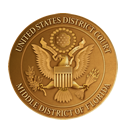- DISCLOSURE AND REPORTS OF EXPERT WITNESSES. Each party should disclose the identity of prospective retained expert witnesses and provide a complete expert report under Rule 26(a)(2), Federal Rules of Civil Procedure, within the time provided in the Court's Case Management and Scheduling Order (which often adopts the schedule proposed by the parties in the Case Management Report). This includes any expert witness retained by another party (such as a co-defendant's expert) who may be used by the disclosing party. The expert report is not required of a "hybrid" witness, such as a treating physician, who was not specifically retained for the litigation and will provide both fact and expert testimony (though non-retained experts must still be disclosed and are subject to regular document and deposition discovery). The parties are encouraged to communicate openly about all opinions that a treating physician is expected to render in support of a party's case.
Rule 26(b)(4)(C), Federal Rules of Civil Procedure, requires:
Unless otherwise stipulated or ordered by the court, if the witness is not required to provide a written report, this disclosure must state:
- the subject matter on which the witness is expected to present evidence under Federal Rules of Evidence 702, 703, or 705; and
- a summary of the facts and opinions to which the witness is expected to testify.
- the subject matter on which the witness is expected to present evidence under Federal Rules of Evidence 702, 703, or 705; and
- SCHEDULING THE DEPOSITION. Pursuant to Rule 26(b)(4)(A), Federal Rules of Civil Procedure, a party may depose any person who has been identified as an expert whose opinions may be presented at trial. If a report from the expert is required under Rule 26(a)(2)(B), the deposition shall not be conducted until after the report is provided.
